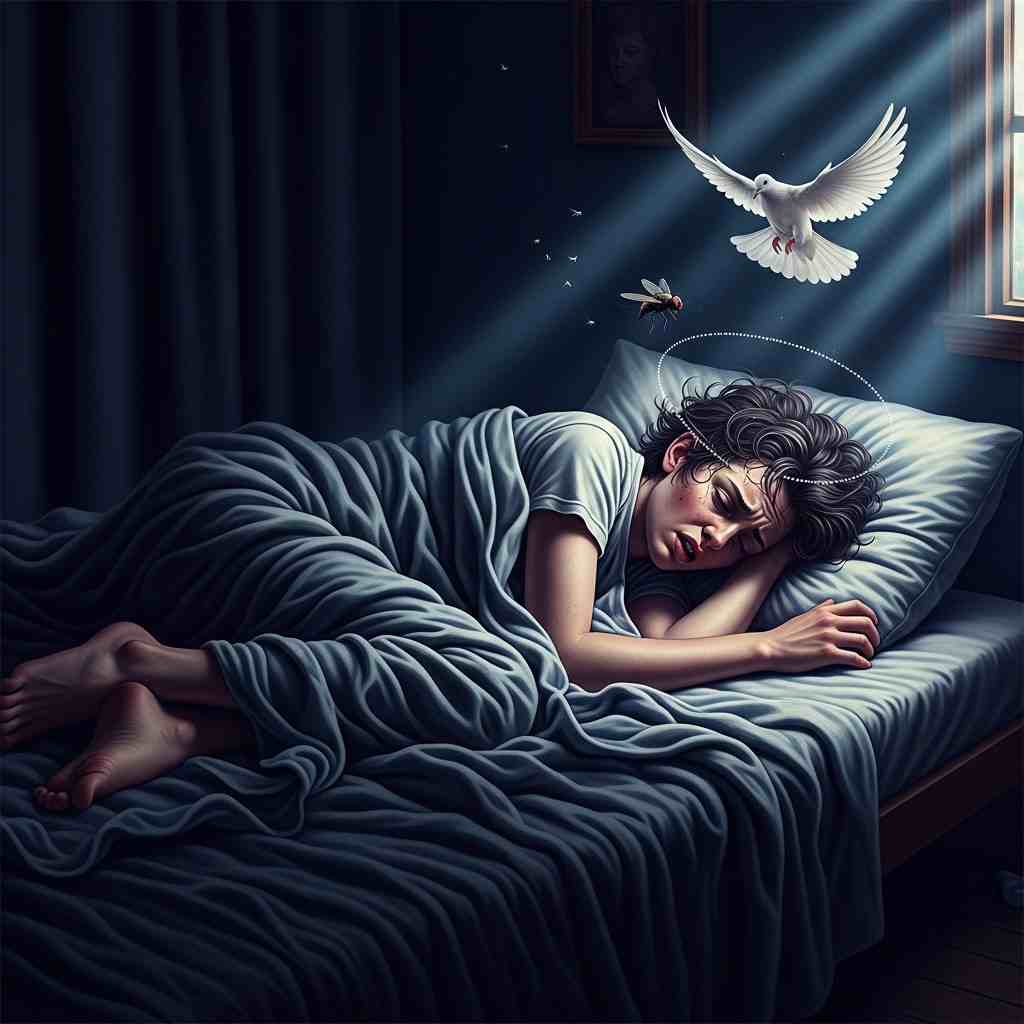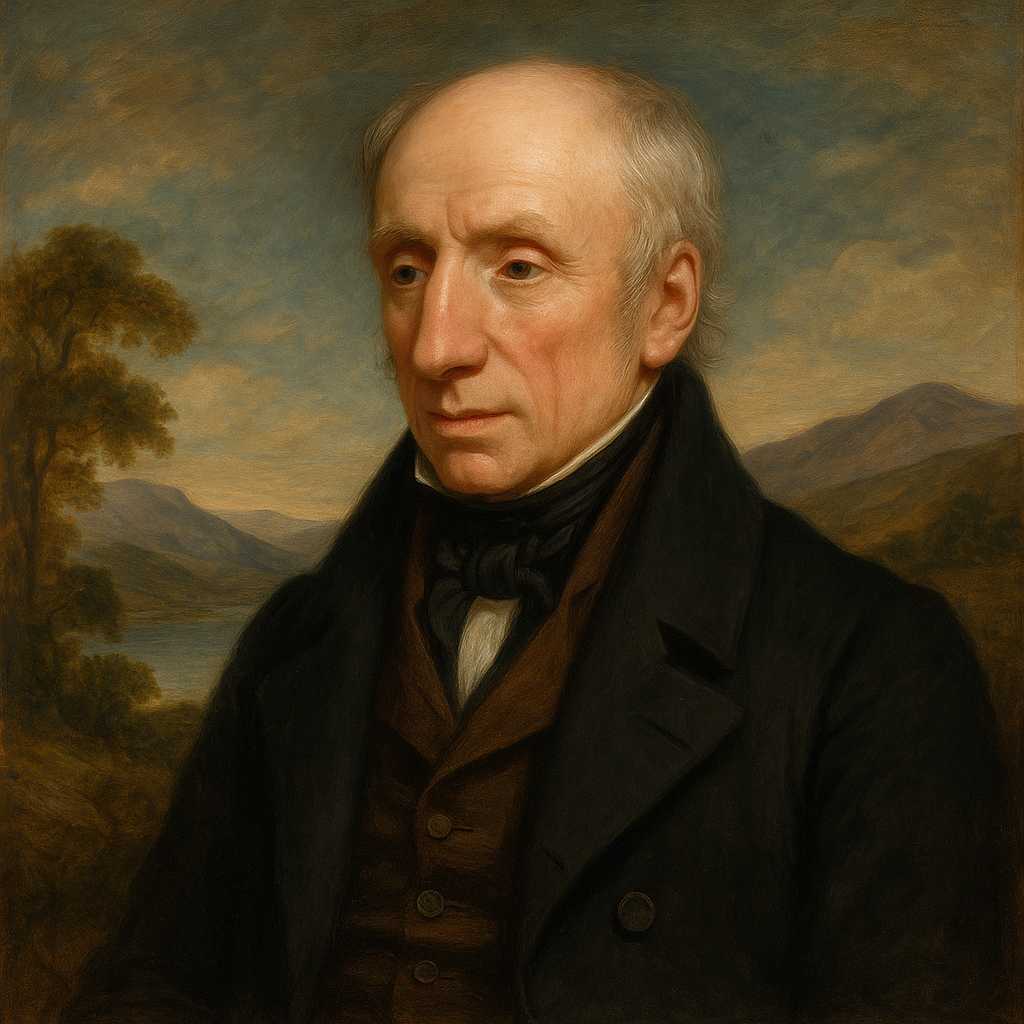O gentle Sleep!
William Wordsworth
1770 to 1850

O gentle Sleep! do they belong to thee,
These twinklings of oblivion? Thou dost love
To sit in meekness, like the brooding Dove,
A Captive never wishing to be free.
This tiresome night, O Sleep! thou art to me
A Fly, that up and down himself doth shove
Upon a fretful rivulet, now above,
Now on the water vex'd with mockery.
I have no pain that calls for patience, no;
Hence am I cross and peevish as a child:
Am pleas'd by fits to have thee for my foe,
Yet ever willing to be reconciled:
O gentle Creature! do not use me so,
But once and deeply let me be beguiled.
William Wordsworth's O gentle Sleep!
William Wordsworth’s short lyric "O Gentle Sleep!" is a compelling exploration of insomnia, human vulnerability, and the paradoxical desire for rest. Though not as widely anthologized as his more famous works like "I Wandered Lonely as a Cloud" or "Tintern Abbey," this sonnet encapsulates Wordsworth’s ability to merge personal anguish with universal themes. Written in a moment of nocturnal frustration, the poem oscillates between tender supplication and irritable exasperation, embodying the restless psyche of a sleepless speaker. This essay will examine the poem’s historical and cultural context, its rich literary devices, its central themes, and its emotional resonance, while also considering Wordsworth’s broader philosophical preoccupations.
Historical and Cultural Context
Wordsworth composed "O Gentle Sleep!" during the early 19th century, a period marked by Romanticism’s emphasis on individual emotion, nature, and the sublime. Sleep—often idealized in poetry as a restorative, almost mystical state—was a frequent subject for Romantic writers. Samuel Taylor Coleridge, Wordsworth’s close friend and collaborator, famously struggled with insomnia and opium addiction, which influenced his own depictions of restless nights (e.g., "The Pains of Sleep"). Wordsworth’s poem can be read in dialogue with this tradition, though his treatment of sleep is less nightmarish than Coleridge’s and more vexed by quiet desperation.
Additionally, the poem reflects the broader Romantic fascination with states of consciousness. The Romantics were deeply interested in liminal experiences—those between waking and dreaming, reason and imagination. Wordsworth’s insomnia here is not merely a physical ailment but a psychological and almost spiritual crisis, where the inability to sleep becomes a metaphor for a deeper disquiet.
Literary Devices and Structure
Though the poem is a sonnet, this analysis will focus not on its rhyme scheme but on its rhetorical and figurative strategies. Wordsworth employs a series of shifting metaphors to depict sleep, each revealing a different facet of the speaker’s relationship with it.
1. The Paradoxical Personification of Sleep
The poem opens with an apostrophe: "O gentle Sleep!"—a direct address that establishes sleep as a personified force. Yet this gentleness is immediately undercut by ambiguity. The speaker questions whether fleeting moments of unconsciousness ("These twinklings of oblivion") truly belong to Sleep, suggesting that such brief respites are insufficient. The metaphor then shifts: Sleep is likened to a "brooding Dove," a symbol of peace and meekness, yet one that is paradoxically a "Captive never wishing to be free." This image suggests that Sleep is both a passive presence and an elusive one, content in its own stillness but unwilling to grant the speaker relief.
2. The Disruptive Fly Metaphor
The most striking metaphor comes in lines 5-8, where Sleep transforms from a gentle dove into a "Fly, that up and down himself doth shove / Upon a fretful rivulet." Here, the speaker’s frustration erupts. The fly’s erratic movements mirror the speaker’s agitated mind, unable to settle. The "fretful rivulet"—a small, restless stream—becomes a metaphor for the speaker’s thoughts, disturbed by Sleep’s "mockery." Unlike the dove, which is serene, the fly is an irritant, emphasizing how Sleep, once desired, now torments with its refusal to come.
3. The Childlike Speaker
The volta (turn) in line 9 introduces a confessional tone: "I have no pain that calls for patience, no; / Hence am I cross and peevish as a child." The admission is striking in its self-awareness. The speaker acknowledges that his suffering is not profound—there is no "pain that calls for patience"—yet his inability to sleep reduces him to childish petulance. This moment humanizes the speaker, making his plea more poignant. The simile "as a child" evokes vulnerability, suggesting that sleeplessness strips away adult composure, leaving raw, unfiltered emotion.
4. The Ambivalent Relationship with Sleep
The speaker’s attitude toward Sleep is deeply conflicted. He claims to be "pleas'd by fits to have thee for my foe," suggesting a perverse enjoyment of the struggle, yet he is "ever willing to be reconciled." This push-and-pull dynamic captures the essence of insomnia: the desperate desire for sleep coexists with a strange, almost combative relationship with it. The final plea—"O gentle Creature! do not use me so, / But once and deeply let me be beguiled."—reveals exhaustion. The word "beguiled" is particularly resonant, implying not just sleep but an almost enchanted surrender to it.
Themes and Philosophical Undercurrents
1. The Elusiveness of Rest
At its core, the poem grapples with the human need for rest and the cruelty of its denial. Unlike the restorative sleep often depicted in poetry (e.g., Shakespeare’s "Macbeth" where sleep is "the balm of hurt minds"), Wordsworth’s Sleep is capricious, teasing the speaker with "twinklings of oblivion" but never granting full reprieve. This aligns with Romanticism’s preoccupation with longing—the idea that the most desired states are often the most unattainable.
2. The Fragility of Human Control
The poem underscores how little control humans have over their own minds and bodies. The speaker, though articulate and self-aware, is reduced to childlike frustration by something as simple as the inability to sleep. This theme resonates with Wordsworth’s broader philosophical concerns about the limits of human agency, as seen in "Tintern Abbey," where he meditates on the mind’s power to shape perception but also its susceptibility to weariness.
3. The Paradox of Desire and Resistance
A subtle but compelling theme is the speaker’s ambivalence—he both craves sleep and engages with it as an adversary. This duality mirrors broader Romantic tensions between surrender and resistance, whether to nature, emotion, or the unconscious. The poem’s closing plea ("let me be beguiled") suggests a yearning not just for sleep but for passive submission, a relinquishing of the waking self.
Comparative Analysis
Wordsworth’s poem invites comparison with other literary treatments of insomnia. John Keats’ "To Sleep" ("O soft embalmer of the still midnight") also personifies sleep as a benevolent force, but Keats’ tone is more reverent, lacking Wordsworth’s irritation. Conversely, Coleridge’s "The Pains of Sleep" delves into the horrors of sleeplessness with Gothic intensity, far removed from Wordsworth’s more restrained vexation.
A fascinating parallel can also be drawn with contemporary depictions of insomnia, such as Sylvia Plath’s "Insomniac," where sleeplessness becomes a metaphor for existential dread. While Wordsworth’s speaker is peevish rather than despairing, both poets capture the way insomnia fractures the self.
Emotional Impact and Conclusion
What makes "O Gentle Sleep!" so affecting is its raw honesty. Wordsworth does not dramatize his sleeplessness as a tragic affliction but renders it with wry self-awareness. The shift from tender apostrophe ("O gentle Sleep!") to exasperated metaphor ("a Fly, that up and down himself doth shove") mirrors the irrational mood swings of a tired mind. The final plea—"But once and deeply let me be beguiled."—lands with quiet desperation, a universal cry for respite.
In just fourteen lines, Wordsworth captures a profoundly human experience, blending humor, frustration, and longing. The poem’s power lies in its specificity—the way it transforms a mundane struggle into a miniature psychological drama. For anyone who has lain awake, yearning for sleep that refuses to come, Wordsworth’s words resonate across centuries, a testament to poetry’s ability to articulate even the most fleeting yet universal pains.
Ultimately, "O Gentle Sleep!" is more than a poem about insomnia; it is a meditation on human vulnerability, the limits of control, and the delicate dance between desire and denial. In its quiet urgency, it reminds us that some of the deepest struggles are those waged in the dark, solitary hours of the night.
This text was generated by AI and is for reference only. Learn more
Want to join the discussion? Reopen or create a unique username to comment. No personal details required!



Comments
No comments yet. Be the first to comment!